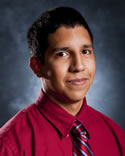For undergraduates seeking an enriched academic experience, spending a summer conducting research opens a world of opportunities. Students from the University of Houston Cullen College of Engineering who are on the track to graduate school, or to the engineering industry post-graduation, benefit by participating in the Summer Undergraduate Research Fellowship (SURF) program.
For mechanical engineering senior Hilario Torres, the hands-on experience of his project was invaluable. SURF allows students to find their own research options, and after approaching professor Will Metcalfe and associate professor Stanley Kleis for a project in fluid mechanics, he chose research involving the study of blood flow, specifically, finding a low-cost, non-invasive way to screen for cardiovascular disease. Using a device that is similar to blood pressure cuffs, the researchers measure vascular reactivity.
The device stops blood flow to the subject’s arm for a brief amount of time, and this lowers temperature in the arm. "We put a probe on the subject’s finger and we’re able to see the temperature difference," said Torres. "Core temperature is warmer than room temperature, and the heat transfer from the air to the finger cools it off. It holds for about two to five minutes, and after release we see the temperature increase. Veins dilate upon release. Vascular reactivity is a response to the need for oxygen and nutrients to make up for lack of blood flow."
Torres studies the temperature rebound: the difference between how much the finger temperature goes over the degree it normally is, and the drop. This variance indicates how much the subject’s arteries dilate. The more they dilate, the more blood flow, and the more heat to the arm.
While not diagnostic, the vascular reactivity test is a good indicator of overall cardiovascular health. The advantage is that it is inexpensive to administer, but can illuminate symptoms of potential abnormalities. Results can supplement further testing. "With current tests, there are many people who are asymptomatic, and they are being told that they’re at a lower risk [for cardiovascular disease] than they really are," Torres said, who worked with Fairway Medical Technologies, a company that produces the new device with a cuff, probe and software that plots out temperature curves.
Torres worked to improve the algorithm by analyzing clinical trial data. He looked for causes of variations in test results, such as air conditioning, an improperly attached probe, or whether the subject ate right before taking the test. Torres correlated the data to ensure true results in subsequent tests.
Torres plans to take graduate classes this fall, with the goal of attaining a Ph.D. The SURF program has allowed him to become familiar with research principles, complementing his experience in industry. Last summer he interned at Marathon Petroleum.
Part of his motivation for participating in the SURF program was to gain a more practical foundation. "I’ve seen the entry-level engineering jobs and I just wanted to get a little more technical from the get-go," he said. "There was a steep learning curve this summer; I had to learn lots of medical terms. It’s really interesting." Torres plans to roll his summer research over into a senior honors thesis, and will work with Professor Metcalfe until he graduates.
The Summer Undergraduate Research Fellowship program at the University of Houston seeks to provide funding for rising UH sophomores, juniors, and seniors to participate in a focused, full-time, 10-week research experience under the direction of UH faculty. For more information on this and other undergraduate research opportunities, visit the Office of Undergraduate Research.
